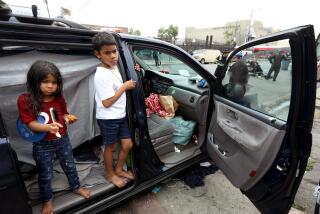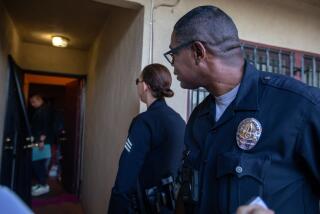BUENA PARK : Pain Shared at Parenting Skills Class
- Share via
The 36-year-old father was looking for answers. His 14-year-old daughter and 12-year-old son both had attempted suicide.
“I came from a dysfunctional family,” he said. “I want to learn better skills so I can give something to my kids I didn’t have when I was growing up. I feel like I may be part of their problems.”
He and other parents gathered last week for a common purpose: Each was searching for ways to become a better parent.
The 31 people attended the first session of the Buena Park Parent Project, which is offered through the Police Department in cooperation with Soledad Enrichment Action, a program that started in 1972 to offer parenting skills and support to families in East Los Angeles.
Buena Park parents expressed concerns, frustrations and pain over the rearing of their children.
Some blamed themselves for problems with their children, some wanted to learn how to communicate and some wanted help in keeping their children away from drugs and gangs.
“We want help so he doesn’t run into worse problems than he has already,” explained a 29-year-old mother of three boys, whose 12-year-old has been in trouble at school. “I’ve never been to something like this. But I know we need something.”
The free program consists of a two-hour class once a week for 20 weeks and is conducted in both Spanish and English.
Barbara Baiz, director of the Parent Project and Buena Park’s gang prevention adviser, said the program is aimed at parents who have troubled youngsters.
It offers them parenting skills and information about preventing gang involvement.
The program empowers parents to regain control of their children and their families, said Brother Modesto Leon, a Catholic priest who founded the program after the fatal shooting of a 16-year-old prompted parents to came together to see what they could do about gangs.
Leon said that 29 parent groups are meeting in Los Angeles.
Sister Inez Telles said that for many parents, the program is a last resort.
“They come with negative emotions: guilt, shame, hurt, anger. As they move through the program and they put skills into practice, their self-esteem grows and there are changes in their children. It makes them feel powerful. It’s a good feeling when it’s yours and you haven’t given it away to your children,” she said.
Telles said parents learn that they cannot change their children, but that they can change themselves.
“Then the child starts to change because they respond to a different person,” she said.
“The parents also learn that they are not owners of their children but that they are the teachers, the role models and the guides.”
More to Read
Sign up for Essential California
The most important California stories and recommendations in your inbox every morning.
You may occasionally receive promotional content from the Los Angeles Times.













